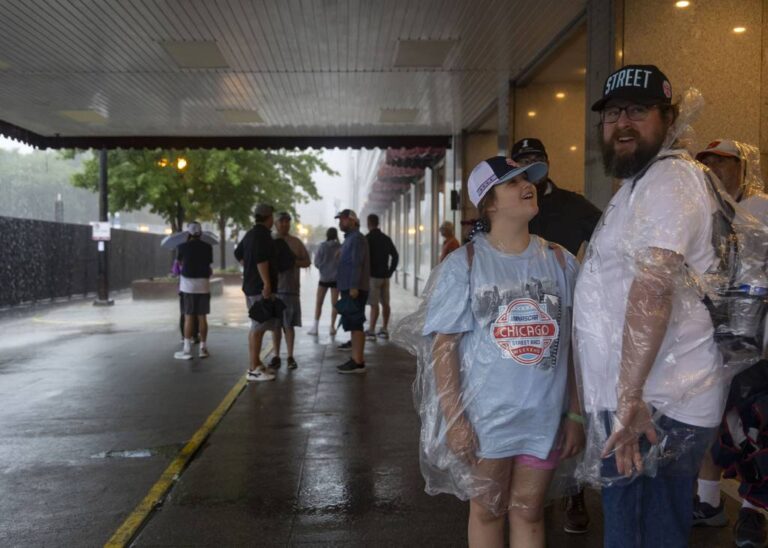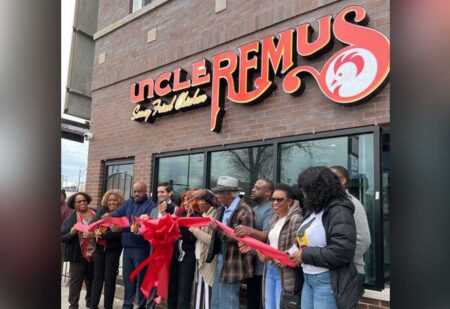It was no Taylor Swift, but the NASCAR Chicago Street Race helped Chicago hotels hit the biggest pre-July Fourth weekend totals in nearly a decade, according to Choose Chicago, the city’s tourism arm.
The rain-soaked weekend fell short of a hoped-for hotel sellout, however.
Chicago hotels averaged more than 36,000 room bookings per night from June 30 to July 2, an occupancy rate of about 79%, according to data released Tuesday by Choose Chicago. Many of those hotel rooms likely provided shelter from the storms for out-of-towners, as torrential rains flooded large swaths of the city and the pop-up 2.2-mile racecourse for much of the weekend.
Choose Chicago credits both the inaugural Chicago Street Race and the USA Volleyball girls junior national championship at McCormick Place for boosting hotel occupancy to the highest level during the weekend preceding July Fourth since 2015, when the Grateful Dead sold out Soldier Field for three straight nights.
Having the actual July Fourth holiday fall on a weekday makes direct year-over-year comparisons “difficult,” said Choose Chicago spokesperson Cynthia McCafferty. The hotel analysis does not include years where July Fourth occurs on a weekend, she said.
Chicago hotels saw a record weekend in early June when the confluence of three sold-out Taylor Swift shows at Soldier Field and the annual American Society of Clinical Oncology meeting at McCormick Place filled nearly 97% of rooms, according to Choose Chicago. An average of more than 44,000 Chicago hotel rooms were occupied each night during the Swift visit.
Hopes were high that the NASCAR race weekend would produce similar results, but McCafferty characterized the 79% occupancy as “modestly solid” at best.
Hotel revenue for the weekend totaled $27.2 million over the three nights, generating $3 million in local and $1.7 million in state taxes.
A NASCAR-commissioned economic impact study projected the Chicago Street Race would bring the city $113.8 million in spending, $3.2 million in tax revenue, 850 full-time equivalent jobs and 24,000 hotel room nights.
Choose Chicago did not break down how many of the 36,000 rooms were booked for NASCAR but plans to release a total economic impact analysis of the street race later in the summer.
The Chicago hotel industry was hard-hit by the pandemic, with occupancy bottoming at 26% in 2020. Occupancy is expected to reach 70% this year, closing in on pre-pandemic levels, according to Choose Chicago.
Assessing the economic impact of NASCAR weekend could play into whether Mayor Brandon Johnson gives the green light to next summer’s race — the second of at least three booked by the preceding administration of Mayor Lori Lightfoot.
The first street course in NASCAR’s 75-year history featured a 12-turn racecourse through Grant Park, with top drivers navigating closed-off streets lined with temporary fences, grandstands and hospitality suites. The rain let up in time Sunday for New Zealand Supercars champion Shane van Gisbergen to win his NASCAR Cup debut in a come-from-behind finish for the race, which was shortened from 100 to 75 laps because of impending nightfall.
Under the terms of the three-year deal to transform the Grant Park environs into a temporary racecourse, NASCAR will pay the Chicago Park District a $500,000 permit fee this year, $550,000 in 2024 and $605,000 in 2025, with an option to renew for two years.
In addition, NASCAR will pay the Park District a $2 fee per admission ticket, and a 15% commission for food, beverage and merchandise concessions at the event.
A NASCAR spokesperson did not immediately respond to a request for comment Tuesday.
Both NASCAR and the Park District have the option to terminate the agreement for convenience — with no penalty — by providing written notice at least 180 days before the next event.
While planned concerts and other parts of the weekend were rained out, the delayed and shortened Grant Park 220 scored big numbers for a national television audience, averaging nearly 4.8 million viewers on NBC, according to Nielsen.
The race weekend also likely added momentum to the recovering hotel industry. Last week, the state announced Illinois hotel tax revenue hit a record $308 million in fiscal year 2023, which ended June 30, surpassing the previous high of $296 million in 2019.







